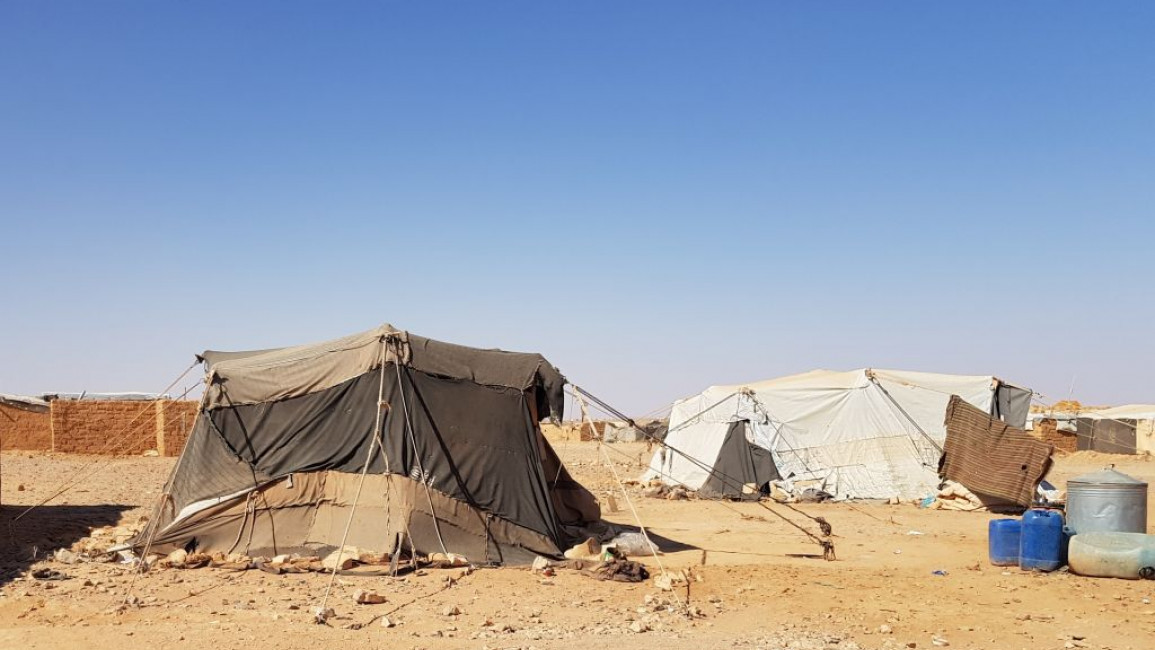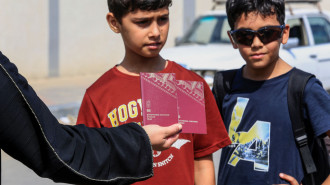Amnesty urges US to provide aid to Syria's Rukban refugee camp
Amnesty International has called on the US to "urgently" provide humanitarian aid to least 8,000 displaced Syrians at the Rukban refugee camp on the border with Jordan and Iraq.
The global rights group said in a press release that the Syrians at the Rukban camp for internally displaced people do not have access to sufficient food, clean water, or healthcare.
"The already dire humanitarian situation at the camp has deteriorated sharply in recent months after the Syrian government tightened the siege it has imposed on the territory around the camp since 2015, setting up checkpoints that have blocked informal smuggling routes that the camp’s residents relied on for essential supplies," Amnesty said.
It added that the last UN humanitarian convoy the Syrian regime let into the camp was in September 2019.
The Tanf military base is close to the camp and the US has de facto effective control over the area in which both sites are situated.
"As such and in light of other governments' human rights failures, the US government has an obligation under international human rights law to ensure that residents of the camp have access to essential supplies," Amnesty said.
Around 80,000 displaced people lived in the Rukban camp before Jordan closed its border to the area in 2016.
That figure has plummeted to 8,000 at present, with most leaving given the "dire" conditions, Amnesty said.
'Arid wasteland'
"It is unfathomable that thousands of people, including children, are stranded in an arid wasteland struggling to survive without access to life-saving necessities," said Aya Majzoub, Amnesty International's deputy director for the Middle East and North Africa.
"The residents of Rukban are victims of a brutal Syrian government siege, they have been barred from safe refuge or faced unlawful deportations at the hands of the Jordanian authorities and been met with apparent nonchalance by the US."
Amnesty spoke with nine Rukban residents, including four members of the camp's community-led political council.
The residents all said they found it difficult to get food and clean water, which are in very short supply.
What food and water are available are sold at extremely high prices most cannot afford.
'Our children are dying'
"Our children are dying. Yesterday, a baby died of malnutrition. He was just 21 days old. A month ago, two other newborn babies died," political council member Mohammad Derbas Al-Khalidi told Amnesty.
Most of the Rukban camp's residents fled to the area a decade ago fleeing Syrian regime and Russian bombardment, as well as the Islamic State group.
Many belonged to the Syrian opposition or defected from regime security forces.
"The camp lacks adequate medical facilities and has no doctors," Amnesty said.
"Instead, residents rely on a medical centre staffed with a few nurses whose salaries are paid by the US. The nurses are not qualified to perform surgery."
Jordan deporting Syrians
Mohammad Al-Fadil, a Rukban camp political council member, said Jordan deports some 100 to 150 Syrians there each year.
He estimated that more than 1,400 Syrians in Jordanian jails are under deportation orders and in danger of being sent to the camp.
"The Syrian government must immediately lift its siege on the area and allow humanitarian aid deliveries to reach residents of the camp," said Majzoub
"In addition, given that the US has de facto effective control over the territory on which the camp is located, it should fulfil its human rights obligations and ensure that the camp’s residents have access to food, water and essential healthcare.
"Meanwhile, the international community must work towards sustainable solutions for the camp’s residents, such as the re-opening of the border with Jordan or safe passage to other areas in Syria where individuals would not face human rights violations."




 Follow the Middle East's top stories in English at The New Arab on Google News
Follow the Middle East's top stories in English at The New Arab on Google News
![People gathered around the rubble of destroyed houses to search for survivors [Getty]](/sites/default/files/styles/image_330x185/public/2024-11/GettyImages-2184733820.jpg?h=199d8c1f&itok=NiM1LO2f)

